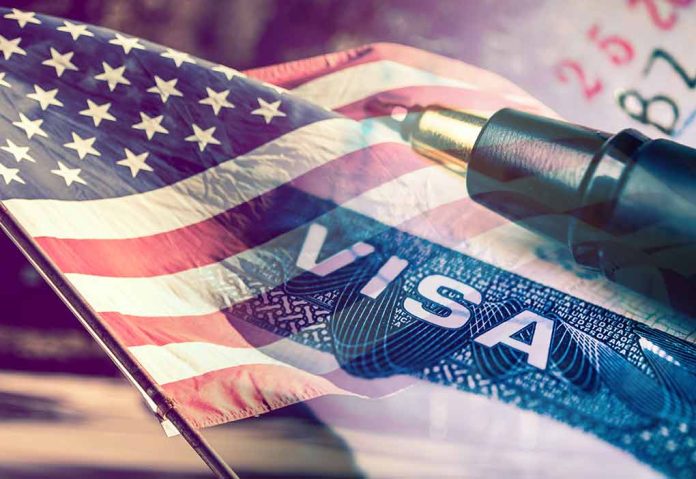
Chad responds to Trump’s travel ban with bold retaliation, suspending all US visa issuance to defend its national pride despite lacking economic leverage against the world’s superpower.
Key Takeaways
- President Mahamat Idriss Deby suspended visa issuance to US citizens in direct response to President Trump’s travel ban affecting Chad and 11 other nations.
- Trump reinstated travel restrictions on 12 countries citing “deficient” screening and vetting processes, with additional restrictions on 7 more countries.
- Chad’s leadership framed their decision as a matter of national dignity and sovereignty rather than economic retaliation.
- The diplomatic standoff highlights the cascading effects of America’s immigration policies on international relations with developing nations.
- Other affected countries like Republic of Congo and Sierra Leone have responded differently, seeking diplomatic clarification rather than immediate retaliation.
Chad Takes Stand Against US Travel Restrictions
President Mahamat Idriss Deby of Chad has announced the immediate suspension of visa issuance to American citizens, striking back against President Trump’s recent travel ban affecting Chadians. The move represents a significant diplomatic pushback from the African nation, which finds itself among 12 countries facing new travel restrictions. Unlike many nations that might absorb such policy changes without formal protest, Chad’s government has chosen to respond with equivalent measures, signaling its unwillingness to accept the US decision without consequence.
The travel ban, which took effect in the early hours of Monday, impacts Afghanistan, Myanmar, Chad, the Republic of Congo, Equatorial Guinea, Eritrea, Haiti, Iran, Libya, Somalia, Sudan, and Yemen. President Trump’s administration justified the restrictions by citing inadequate vetting processes in these countries, continuing his campaign promise to strengthen America’s border security and immigration protocols. The policy demonstrates the administration’s commitment to prioritizing national security concerns over potential diplomatic fallout.
National Dignity Over Economic Power
In announcing Chad’s retaliatory measures, President Deby emphasized his country’s commitment to maintaining its dignity despite lacking economic leverage against the United States. The decision reflects a growing assertiveness among developing nations in international relations, particularly when faced with policies they perceive as unfair or discriminatory. While Chad cannot compete with American economic might, its leadership has determined that principles of sovereignty and reciprocity are worth defending through available diplomatic channels.
“Chad has neither planes to offer, nor billions of dollars to give, but Chad has its dignity and its pride,” said president Mahamat Idriss Deby Itno
This sentiment resonates deeply with many conservative Americans who similarly value national sovereignty and believe countries should stand firm in protecting their interests. The paradox of Chad’s position is that while conservatives typically support strong immigration controls, they also respect nations that assert their sovereignty and dignity in international affairs. The reciprocal visa suspension demonstrates that even without significant economic leverage, nations can still find ways to respond to policies they find objectionable.
Varied Responses from Affected Nations
Not all countries targeted by the travel ban have responded as firmly as Chad. The Republic of Congo, also included in the restrictions, has taken a more conciliatory approach. Government spokesperson Thierry Moungalla suggested the inclusion of his country was likely a misunderstanding, expressing confidence that diplomatic channels would resolve the issue. This measured response highlights the different diplomatic strategies available to nations facing similar challenges from US immigration policy.
“Obviously, Congo is not a terrorist country, is not home to any terrorist, is not known to have a terrorist vocation. So we think that this is a misunderstanding and I believe that in the coming hours, the competent diplomatic services of the government will contact the American authorities here,” said Thierry Moungalla, Republic of Congo Government Spokesperson
Meanwhile, Sierra Leone, which faces heightened travel restrictions rather than an outright ban, has indicated a willingness to address American concerns about their security protocols. This cooperative stance demonstrates how some nations prioritize maintaining positive relations with the United States over retaliatory measures. The variety of responses highlights the complex calculations each country must make based on their specific relationship with America and their domestic political considerations.
Implications for US Foreign Policy
The Chad situation illustrates the ripple effects of America’s immigration policies on our international relationships. While the primary purpose of travel restrictions is to protect American citizens and strengthen homeland security, these measures inevitably impact diplomatic ties with affected nations. The Trump administration’s willingness to accept these diplomatic consequences demonstrates its commitment to putting American security interests first, even at the cost of some international goodwill.
For American travelers and businesses with interests in Chad, the visa suspension creates immediate practical challenges. More broadly, this diplomatic standoff serves as a reminder that immigration policies are not merely domestic matters but significant foreign policy tools with far-reaching consequences. As President Trump continues implementing his promised immigration reforms, similar diplomatic challenges may arise with other nations affected by changing US entry requirements.



